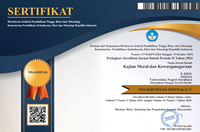PEMBENTUKAN SIKAP PERCAYA DIRI PADA ANAK JALANAN DI UPTD KAMPUNG ANAK NEGERI SURABAYA
DOI:
https://doi.org/10.26740/kmkn.v12n2.p331-347Keywords:
Attitude Formation, Self-Confidence, Street ChildrenAbstract
The formation of self-confidence is an important aspect of children's development that affects their ability to adapt in life. The inability to meet basic needs makes children feel less confident so it is important to support their mental and emotional health in building self-confidence with special support through programs at UPTD Kampung Anak Negeri Surabaya. This study aims to describe the formation of self-confidence in street children and describe the supporting and inhibiting factors in shaping self-confidence in street children. The research approach uses a qualitative approach. The subjects of this study were coaches, assistants, training instructors, and street children, the selection of research subjects was carried out using purposive sampling technique. Data analysis in this study refers to interactive data as proposed by Miles and Huberman with stages, namely data reduction, data presentation and conclusion drawing using Pierre Bourdieu's Habitus Theory. The results showed that the process of forming self-confidence in street children at UPTD Kampung Anak Negeri Surabaya can be achieved through introducing the character of street children, introducing the environment and providing a supportive environment, implementing programs, social activities, education, arts and skills, evaluating and adjusting programs. Meanwhile, the supporting factors for the formation of selfconfidence are adequate facilities and infrastructure, a supportive environment, professional educators, and basic needs are met. The inhibiting factors in shaping self-confidence are the conditioning of children who are difficult to control, the lack of discipline and responsibility of children, and the negative influence of their peers.
Downloads
Downloads
Published
How to Cite
Issue
Section
 Abstract views: 85
,
Abstract views: 85
, PDF Downloads: 151
PDF Downloads: 151





